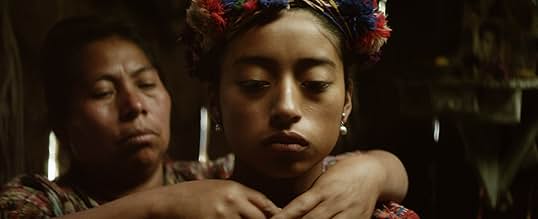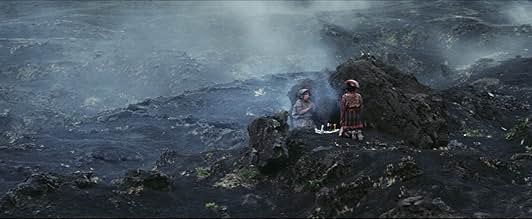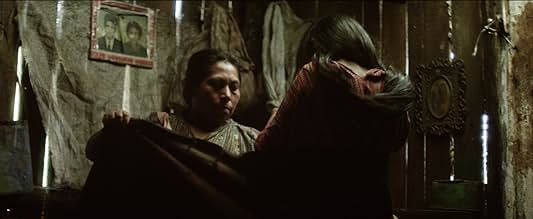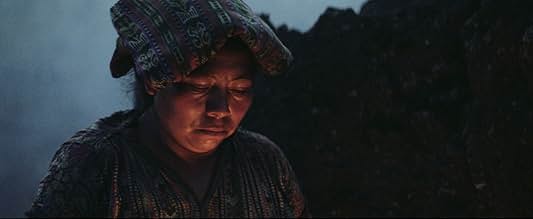AVALIAÇÃO DA IMDb
7,1/10
3,4 mil
SUA AVALIAÇÃO
Nas encostas de um vulcão ativo na Guatemala, seus pais Kaqchikel arranjam um casamento para Maria de dezessete anos.Nas encostas de um vulcão ativo na Guatemala, seus pais Kaqchikel arranjam um casamento para Maria de dezessete anos.Nas encostas de um vulcão ativo na Guatemala, seus pais Kaqchikel arranjam um casamento para Maria de dezessete anos.
- Direção
- Roteirista
- Artistas
- Prêmios
- 23 vitórias e 24 indicações no total
Avaliações em destaque
10tsmada
I had the wonderful experience of watching this film with my Quiché goddaughter, who found the story real and compelling. Maria, 17, is betrothed by her parents to a young man--a decision in which she has no say. Her heart, however, leads her in another direction and therein lies the story's heart. The reality of daily life for thousands of Mayan Guatemalans, many of whom speak only their indigenous language, is conveyed with a realism that never patronizes. It is the daily struggle for life, for work, and dealing in an emergency with a power structure that is far from the experience of those who must confront it. One comment about the description: The film is bilingual: Spanish and Kakchiquel, one of 22 Mayan languages spoken in Guatemala, none of which can communicate with the other. I asked my goddaughter--who is trilingual (Kiché, Spanish, and English)--if she understood any of the Kakchiquel dialogue. "No" was her answer.
Ixcanul is a practically flawless work of naturalistic cinema. Much has been said about the cutural specifics of the film, but not enough about Ixcanul as an argument for the vitality of naturalism, in an era that has been blinkered with frivolous spectacle. The movie treats its audience as adults, never telling them what to think or feel. It's beautifully lit and composed, subtle, thorny and complex. If you can find nothing engaging here, it's hardly the fault of the film.
A beautiful film that very much transports the viewer to the struggles of a girl coming of age and working on a coffee plantation with her parents at the foot of a volcano in Guatemala. The cinematography is gorgeous, the story is heartfelt, and the performances all feel truly authentic. I thank Letterboxd user Muffintree for his suggestion to watch this film, and would recommend it to others as well.
It's clear early on that we're being plunged into a world without the luxury of pretense, where eating pork doesn't mean going in to the air-conditioned market and buying a neatly packaged cut of bloodless pink meat, and living with one's parents doesn't mean being able to pretend they don't have sex, since everyone sleeps in the same room. In this world coffee beans are tediously picked by hand, and workers (who speak indigenous Kaqchikel) are exploited by owners (who also speak the language of the ruling class, Spanish). The owners know that the laborers have few opportunities, and also run a bar where the workers might run up an alcohol tab that erases the earnings they receive from a careful weighing of the beans they've picked. All of this is so that affluent people in far-off lands like America can sip a gourmet brew, made to order by a person with a college degree in English Lit and getting a paltry minimum wage, but I digress.
The daughter (the soulful María Mercedes Coroy) has been betrothed to her father's boss, the foreman of the plantation, a situation that might improve her family's situation. Unfortunately she's more attracted to a field worker who dreams of running away to America to escape the poverty of his life in Guatemala, and drinks to excess maybe to escape it in another way. The way the parents (María Telón and Manuel Manuel Antún) support the daughter is amazing, despite the decisions she makes which have disastrous consequences. The mother-daughter bond is truly special and seems eternal, and I imagined it representing a link which must stretch back generations upon generations into the past. It was also pretty cool to see the father not erupt into anger, instead calmly accepting what happened as if a weather conditions had caused a bad crop one year. Nothing is romanticized here, but the film shows the family bond and perseverance in the face of a hard life, starting with accepting each other.
It's clear early on that we're being plunged into a world without the luxury of pretense, where eating pork doesn't mean going in to the air-conditioned market and buying a neatly packaged cut of bloodless pink meat, and living with one's parents doesn't mean being able to pretend they don't have sex, since everyone sleeps in the same room. In this world coffee beans are tediously picked by hand, and workers (who speak indigenous Kaqchikel) are exploited by owners (who also speak the language of the ruling class, Spanish). The owners know that the laborers have few opportunities, and also run a bar where the workers might run up an alcohol tab that erases the earnings they receive from a careful weighing of the beans they've picked. All of this is so that affluent people in far-off lands like America can sip a gourmet brew, made to order by a person with a college degree in English Lit and getting a paltry minimum wage, but I digress.
The daughter (the soulful María Mercedes Coroy) has been betrothed to her father's boss, the foreman of the plantation, a situation that might improve her family's situation. Unfortunately she's more attracted to a field worker who dreams of running away to America to escape the poverty of his life in Guatemala, and drinks to excess maybe to escape it in another way. The way the parents (María Telón and Manuel Manuel Antún) support the daughter is amazing, despite the decisions she makes which have disastrous consequences. The mother-daughter bond is truly special and seems eternal, and I imagined it representing a link which must stretch back generations upon generations into the past. It was also pretty cool to see the father not erupt into anger, instead calmly accepting what happened as if a weather conditions had caused a bad crop one year. Nothing is romanticized here, but the film shows the family bond and perseverance in the face of a hard life, starting with accepting each other.
With beautiful cinematography and art directon, and a well directed first-time casting, the film tells a story held in a traditional Mayan Kaqchikel community who worships nearby volcano, avoids the snakes that live there, and is exploited by greedy employers in a coffee plantation. María has been promised to marry the foreman of the plantation. However, not only she does not want it, but also is sexually excited in her virgin teen age and is attracted to Pepe. The latter is a drunkard who dreams about fleeing to the United States, where he expects everything is better than in Guatemala countryside. Well, then there is a well built drama, which explores where Kaqchikel rural and indigenous culture. Harsh reality is interwined with magic, the sadness of unsafe uncertainty faces the happiness of life.
I've long been interested in Mayan mythology and culture, so when I heard about a new movie from Guatemala in the Maya language, I knew it was a film I wanted to see. "Ixcanul" is the Maya word for volcano, which looms large in the film, both physically and as a psychological barrier between this village and the rest of the world.
Maria is a teenage girl, beautiful and bold. She lives with her parents, their only child, on a coffee plantation. Her parents have arranged her marriage to the plantation foreman, but neither seem particularly enthused about it. Instead, Maria dreams of escaping to the United States with a local worker. Despite her best attempts to get Pepe's agreement to take her with him North, she never secures a committed response. Her actions, however, have significant repercussions for her and her family.
This could be a film about the uncaring and unsympathetic corporate owners of the plantations, or it could be about the ignorance of peasant life in the Guatemalan villages, or it could be a film that romanticizes North American culture and lifestyle, but it is none of these things. What it is, is an intimate and honest story of a brief moment in time of a family caught on the crossroads of tradition and modernity. "Ixcanul" is Guatemala's first entry in the Academy Awards for Foreign Language Film, and it certainly deserves to win. I am intrigued by the language and have a few unanswered questions, so it is likely I will pick this one up for the collection when released.
Maria is a teenage girl, beautiful and bold. She lives with her parents, their only child, on a coffee plantation. Her parents have arranged her marriage to the plantation foreman, but neither seem particularly enthused about it. Instead, Maria dreams of escaping to the United States with a local worker. Despite her best attempts to get Pepe's agreement to take her with him North, she never secures a committed response. Her actions, however, have significant repercussions for her and her family.
This could be a film about the uncaring and unsympathetic corporate owners of the plantations, or it could be about the ignorance of peasant life in the Guatemalan villages, or it could be a film that romanticizes North American culture and lifestyle, but it is none of these things. What it is, is an intimate and honest story of a brief moment in time of a family caught on the crossroads of tradition and modernity. "Ixcanul" is Guatemala's first entry in the Academy Awards for Foreign Language Film, and it certainly deserves to win. I am intrigued by the language and have a few unanswered questions, so it is likely I will pick this one up for the collection when released.
Você sabia?
- CuriosidadesThe film was selected as the Guatemalan entry for the Best Foreign Language Film at the 88th Academy Awards but was not nominated.
- Trilhas sonorasMala Mujer
[from the albumLos Mejores Éxitos Bailables Vol. 2. Música de Guatemala"]
Performed by Fidel Funes Y Su Marimba Orquesta
Written by Fidel Funes
Published by Edifosa
Courtesy of Difosa
Principais escolhas
Faça login para avaliar e ver a lista de recomendações personalizadas
- How long is Ixcanul?Fornecido pela Alexa
Detalhes
- Data de lançamento
- Países de origem
- Centrais de atendimento oficiais
- Idiomas
- Também conhecido como
- Ixcanul
- Locações de filme
- Empresas de produção
- Consulte mais créditos da empresa na IMDbPro
Bilheteria
- Faturamento bruto nos EUA e Canadá
- US$ 295.157
- Faturamento bruto mundial
- US$ 594.836
- Tempo de duração
- 1 h 33 min(93 min)
- Cor
- Proporção
- 2.35 : 1
Contribua para esta página
Sugerir uma alteração ou adicionar conteúdo ausente





















